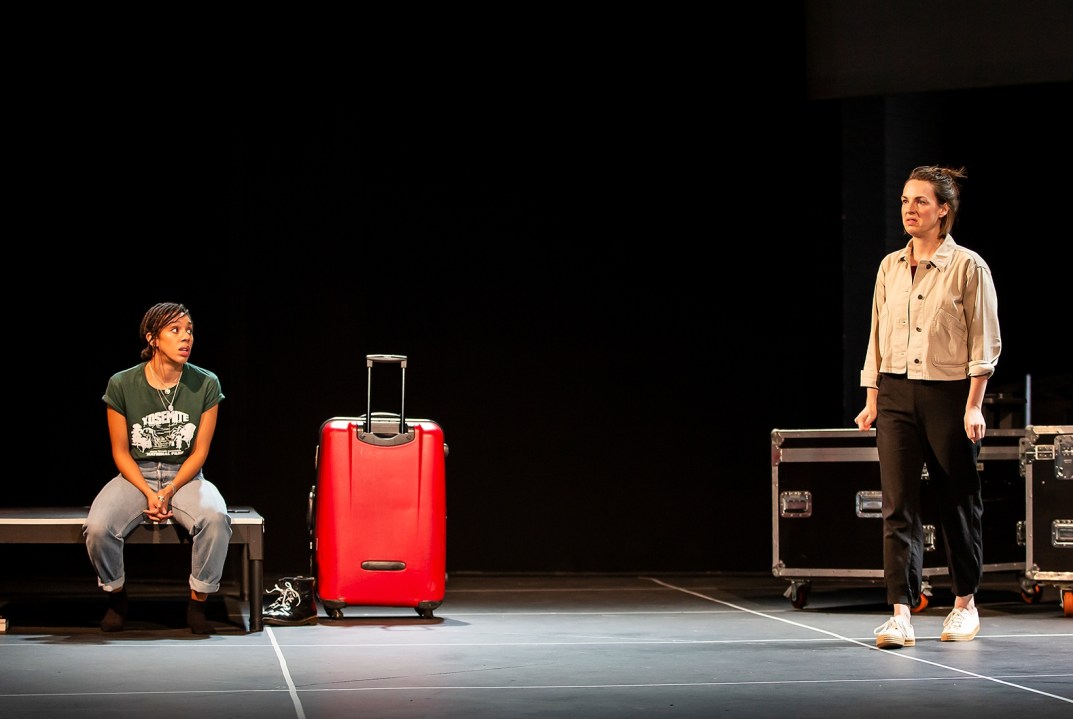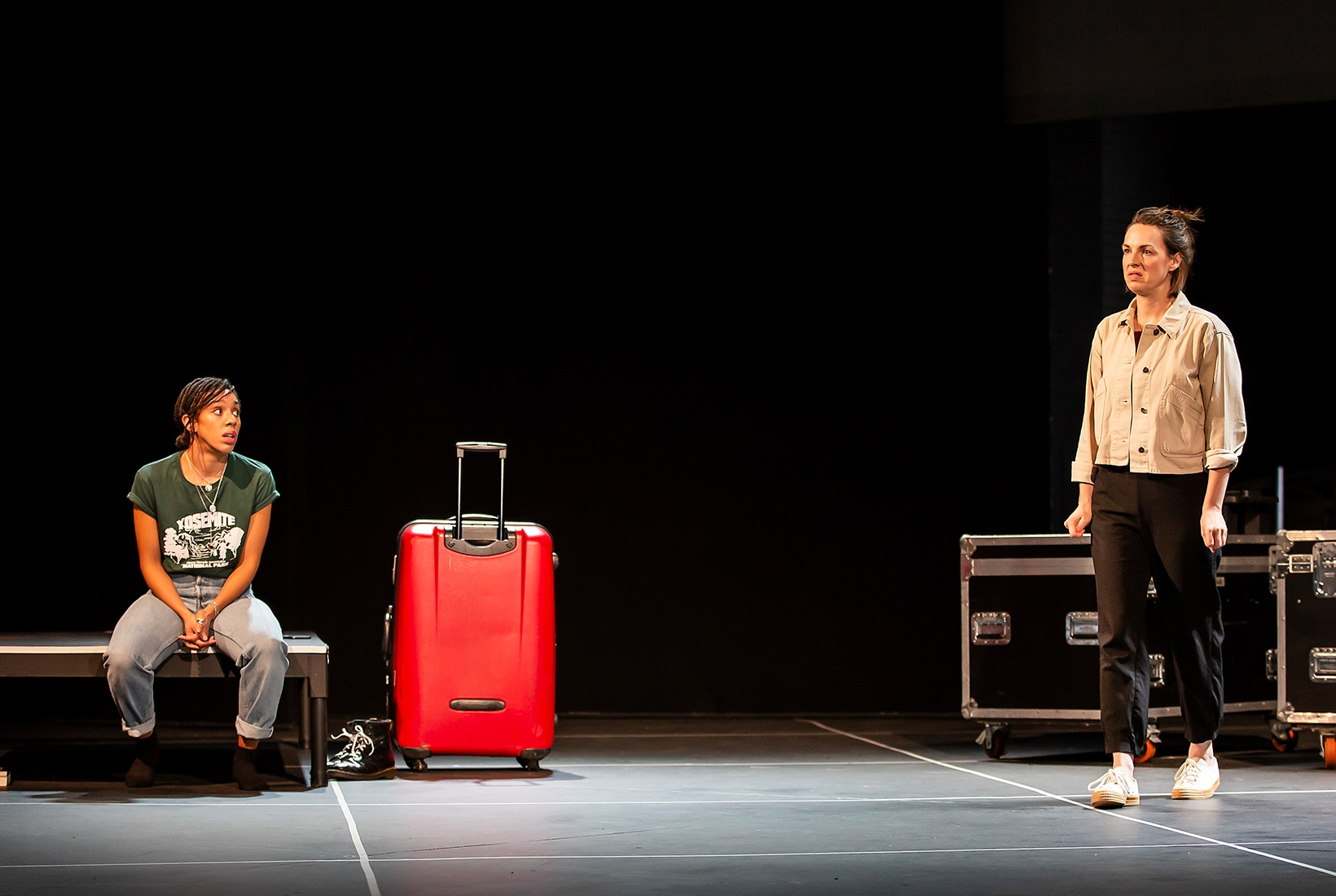Theatres can open if they want to. That’s the current position. The only factor keeping a playhouse dark is a lack of guts or imagination on the part of its leadership. A small pub in Vauxhall, The Eagle, is mounting new plays in its garden space to raise everyone’s morale. Punters must wear masks and sit in bubbles. ‘We’re adhering to the government guidelines,’ announced the artistic director before the start, ‘which are changing all the time.’
The show is a feelgood musical about drifters and dreamers in their twenties trying to make it in New York. Waverley wants to be an actress but her plans are blown off course by a tempting job offer from a law firm. What to do? She has a row with her boyfriend, Darren, a struggling playwright, which brings their affair to a close. Darren insists that he hasn’t been dumped. ‘We mutually decided to pursue different opportunities.’
This wonderful show made me forget I was sitting in a rainy Vauxhall pub on a weekday evening
To antagonise Waverley, he boasts about a fictional new romance. This sends her out on a manhunt. In a bar she approaches a handsome stranger, Luke, and asks him to decide which snack — ‘pecans or pretzels’ — he would prefer if they were the only foodstuffs available for the rest of his life. ‘Why do I have to choose only one?’ he says. ‘Good answer,’ nods Waverley, ‘come home with me.’ But Luke happens to be a buddy of Darren’s. This simple triangle drives the drama forward and though it’s hardly an original set-up, the script is witty and the characters are credible and easy to like.
Darren has a gay friend, Lisa, who dubs him ‘the ineffectual heterosexual’. Lisa urges Waverley to move with her to Los Angeles. ‘Not California,’ shudders Waverley, ‘they’ve got earthquakes and mudslides and Ellen DeGeneres.’ This wonderful show succeeded in making me forget I was sitting in a rainy Vauxhall pub on a weekday evening. For 90 glorious minutes I was whisked away to the heart of glamorous Manhattan.
The cast are newcomers who graduated from drama school this year. Quite a crop. Nathan Shaw plays Darren as a bumptious charmer. The magnetic Callum Henderson gives Luke plenty of self-mocking swagger. Amelia Atherton turns Lisa (an underwritten role) into a golden-hearted mother hen. The outstanding talent here is Bessy Ewa (Waverley), who has a fine voice, catwalk looks and terrific skills as a light comedian. One for the future.
James Graham has turned his gaze on the summer lockdown and created a comedy–drama which also works as a documentary. When future generations ask about the Great Terror of 2020 they’ll turn to Bubble to discover what it was like. The setting is Nottingham where two lesbians, Ashley and Morgan, meet at an ice-rink and enjoy ‘an amazing date’. The next day, lockdown is announced. Should the girls split up and live ‘like nuns’ for the next three months or take the plunge and move in together? ‘What’s the worst that could happen? We kill each other.’ Ashley arrives at Morgan’s flat but the problems begin even before her suitcase is open. It contains sex-toys — ‘just in case’ — which she wants to conceal from Morgan.
The play follows all the key events of the past seven months. When the PM is hospitalised, Ashley publishes a malicious remark on Twitter and dares Morgan to retweet it as proof of her affection. Though cooped up in a flat, they return to nature by planting seeds in window-boxes and learning the mating calls of song-birds. Morgan is surprised to find herself fatigued by a surfeit of indolence. ‘How can I be tired all the time when I’m doing much less for longer?’
The killing of George Floyd turns both characters into familiar stereotypes. Morgan succumbs to liberal guilt and sends out for books about white privilege. Ashley, who is black, becomes unapologetically racist. ‘I just want to be with people who look like me.’ Graham has a marvellous ability to shift imperceptibly between the political and the personal. When Morgan blurts out ‘I love you’, the couple appear to have reached a new level of intimacy. But she ruins it by withdrawing her pledge immediately. ‘Don’t read too much into that,’ she says ludicrously. Ashley tells her that ‘I love you’ should never be a matter for contrition. Morgan: ‘I apologised in case I said it without meaning it.’ Ashley rounds on her: ‘Then definitely apologise.’
It’s amazing how far and how fast the emotional pendulum swings in this brief, four-line exchange: from accidental tenderness to deliberate tenderness to confused tenderness,to tenderness rejected and curdling into hostility. The script is full of such densely packed and exquisitely rendered moments. For me, this looks like the first lockdown drama that will endure. It works perfectly as chamber piece and one day it will be a history lesson.








Comments